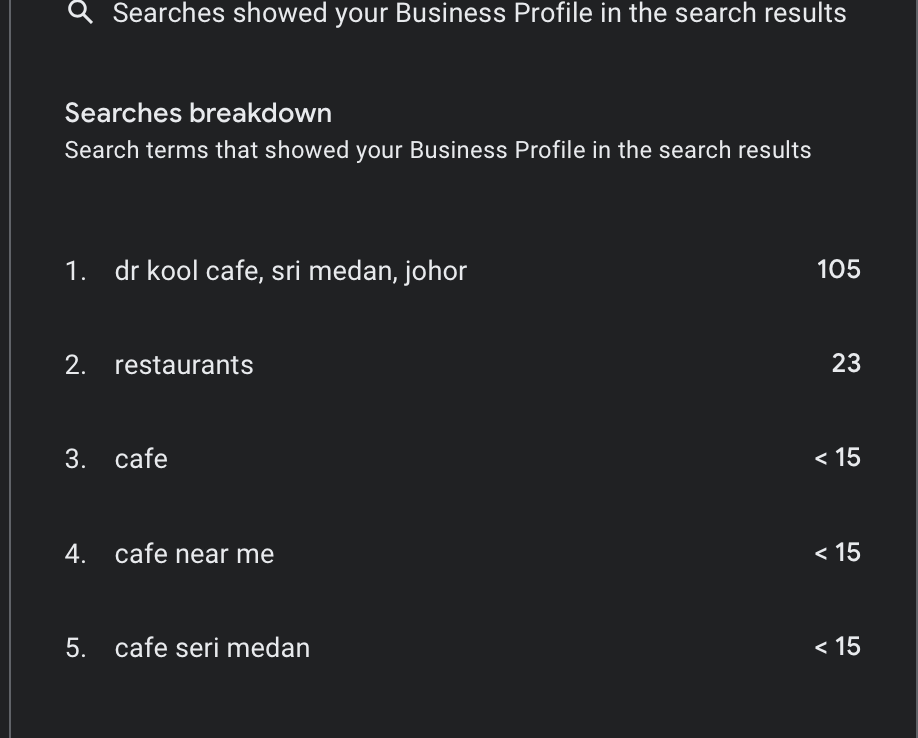How To Do Local SEO Keyword Research
This article explain the process of local keyword research, including tools and strategies to identify high-value keywords.
LOCAL SEO


Keyword research is the backbone of any successful SEO strategy, and it's particularly crucial for local businesses. Understanding what people are searching for in your area can help you optimize your website, content, and online listings to attract more customers. In this guide, we'll delve into the process of local keyword research, providing you with the tools and strategies to identify high-value keywords for your business.
Understanding the Importance of Local Keywords
Before we dive into the research process, let's clarify why local keywords matter. When someone searches for a product or service near them, they typically include location-specific terms in their query. For instance, a person looking for a plumber in Kuala Lumpur might search for "plumber in KL" or "emergency plumber Kuala Lumpur." By targeting these local keywords, you increase your chances of appearing in relevant search results.
The Local Keyword Research Process
Now that we understand the importance of local SEO, let’s dive into the process of finding the right keywords for your business. Here’s a step-by-step guide:
1. Start with Your Services and Products
Begin by listing all the services or products your business offers. This list will form the foundation of your keyword research. Think about how your customers might describe your offerings, and consider any variations in terminology.
Example: If you run a dental clinic, your list might include "teeth whitening," "dental implants," "routine cleanings," and "emergency dental services."
Why is this important? This step ensures that your keyword research is aligned with what your business actually provides, helping you to attract customers who are specifically looking for what you offer.
2. Identify Your Geographic Area
Determine the specific geographic areas you want to target. This could include your city, neighboring towns, or even specific neighborhoods. It's important to be as precise as possible to ensure that your keyword research reflects the area from which you want to draw customers.
Example: If your business is located in Ipoh, you might target keywords like "dental clinic in Ipoh," "teeth whitening in Greenwood," or "emergency dentist near Tambun."
Why is this important? Targeting specific areas helps narrow down your audience, making your SEO efforts more effective by focusing on the regions where your potential customers are most likely to be.
3. Use Google’s Autocomplete Feature
Google's autocomplete feature is a simple yet powerful tool for discovering potential keywords. Start typing a search query related to your business into Google, and see what suggestions pop up. These suggestions are based on what people are actually searching for, making them valuable for your local SEO keyword research.
Example: When you type "dentist in," Google might suggest "dentist in Ipoh," "dentist in Bercham Ipoh", or "dentist in Air Putih", and so on.
Why is this important? This method can reveal popular search terms that you might not have thought of, helping you to refine your list of potential keywords.


Example of Google Autocomplete
4. Leverage Google Business Profile Insights
Google Business Profile (GBP) is an essential tool for any local business. GBP provides insights into how customers find your business online, including the search terms they use. By analyzing these insights, you can identify keywords that are already driving traffic to your business.
How to use it:
Sign in to your Google Business Profile account.
Navigate to the "Insights" tab.
Look at the "Queries used to find your business" section to see which search terms people are using.
Example: If you notice that many people are finding your business through the query "affordable dentist in Ipoh," you might want to focus more on optimizing for this keyword.
Why is this important? These insights provide real-world data about how customers are finding you, allowing you to refine your local SEO strategy based on actual user behavior.


Section "Queries used to find your business" in Google Business Profile
5. Explore Localized Keyword Research Tools
Several tools are designed specifically for local keyword research. These tools can help you identify high-value keywords that are relevant to your business and geographic area.
Top Tools for Local SEO Keyword Research:
Google Keyword Planner: Originally designed for Google Ads, this tool can also be used for local SEO. You can filter results by location to find keywords relevant to your area.
Moz Local: This tool helps manage local listings and provides insights into how your business is performing in local searches. It also offers keyword suggestions based on local searches.
SEMrush: SEMrush offers a comprehensive keyword research tool that allows you to focus on local keywords. You can track your competitors and see which keywords they are ranking for in your area.
Ahrefs: Known for its extensive keyword data, Ahrefs lets you explore keyword ideas, analyze search volumes, and discover keyword opportunities at a local level.
Why is this important? Using specialized tools can give you a competitive edge by uncovering keywords that are often overlooked by your competitors.
6. Analyze Competitor Keywords
Analyzing your competitors' keywords is a great way to uncover opportunities for your own local SEO strategy. Tools like SEMrush and Ahrefs allow you to see which keywords your competitors are ranking for, helping you identify gaps and opportunities.
How to do it:
Use a tool like SEMrush or Ahrefs to enter your competitor's URL.
Review the keywords they are ranking for, particularly those that include local terms.
Look for keywords where your competitor is ranking well, but you are not.
Example: If your competitor is ranking for "emergency dental services in [City]," and you offer the same service but aren't ranking as high, this keyword could be an opportunity for you to target.
Why is this important? Understanding what works for your competitors can help you improve your own strategy and ensure you aren't missing out on valuable traffic.


7. Consider Long-Tail Keywords
Long-tail keywords are longer, more specific phrases that often have lower search volumes but higher intent. These keywords are usually less competitive and can be a goldmine for local SEO.
Example: Instead of targeting the broad keyword "dentist Ipoh," you might target "best pediatric dentist in Ipoh" or "affordable cosmetic dentist in Ipoh."
Why is this important? Long-tail keywords are highly targeted, meaning the people searching for them are more likely to be ready to make a purchase or book a service, leading to higher conversion rates.
8. Incorporate Local Landmarks and Features
Including local landmarks, neighborhoods, or other geographic features in your keywords can help you connect with hyper-local audiences. This strategy is particularly effective for businesses that serve a specific part of a larger city.
Example: If your dental clinic is near KLCC, you might use keywords like "dentist near KLCC" or "teeth cleaning in the Jalan P.Ramlee."
Why is this important? This approach helps your business appear in searches from people who are in or familiar with these specific areas, increasing your chances of attracting local customers.
9. Use Google Trends for Seasonal Keywords
Google Trends is a powerful tool for identifying keyword trends over time. By examining seasonal trends, you can adjust your keyword strategy to target relevant terms during peak times.
How to use it:
Go to Google Trends and enter your main keywords.
Filter by location to focus on your target area.
Look at the interest over time to see when these keywords peak.
Example: If "teeth whitening" peaks in the summer months, you might focus on this keyword more heavily during that time.
Why is this important? Understanding when certain keywords are popular can help you optimize your content and marketing efforts to capture more traffic during those periods.
10. Optimize for Voice Search
With the rise of voice-activated devices like Siri, Alexa, and Google Assistant, voice search has become a significant factor in local SEO. Voice search queries tend to be longer and more conversational, so it's essential to include these types of keywords in your strategy.
Example: Instead of targeting "dentist Ipoh," consider phrases like "Where can I find a dentist near me?" or "Who is the best dentist in Ipoh?"
Why is this important? As more people use voice search, optimizing for these types of queries can help you stay ahead of the competition and capture more local traffic.
11. Create Location-Specific Landing Pages
To fully leverage your local keywords, create landing pages that are optimized for specific locations. Each page should be tailored to a particular area, featuring relevant keywords, content, and local information.
Example: If you serve multiple neighborhoods in Ipoh, Perak, create a landing page for each one, such as "Dental Services in Ipoh" and "Teeth Whitening in Ipoh"
Why is this important? Location-specific landing pages can help you rank for a broader range of local keywords, increasing your visibility in multiple areas and attracting more customers.
12. Monitor and Adjust Your Keywords
Keyword research is not a one-time task. To maintain your local SEO success, you need to regularly monitor your keyword performance and make adjustments as needed.
How to do it:
Use tools like Google Search Console, SEMrush, or Ahrefs to track your rankings.
Regularly review your keyword list and adjust based on changes in search trends, competition, and customer behavior.
Why is this important? Staying on top of your keyword performance ensures that your local SEO strategy remains effective and that you continue to attract the right audience.
Incorporating Local Keywords into Your SEO Strategy
1. Optimize Your Google Business Profile Listing
Google Business Profile (GBP) is a critical tool for local SEO. Optimizing your GBP profile with the right keywords can significantly boost your visibility in local search results and on Google Maps.
Steps to Incorporate Keywords:
Business Name: While it’s not recommended to stuff your business name with keywords, if possible, include a primary keyword that accurately reflects your business. For example, "Dr.Wong’s Dental Care - Family Dentist" instead of just "Dr.Wong’s Dental Care."
Business Description: Use relevant local keywords naturally within your business description. Focus on what your business offers and your location.
Example: "Dr.Wong’s Dental Care offers comprehensive family dental services in downtown Ipoh, including teeth whitening, dental implants, and emergency care."
Categories: Choose the most accurate categories for your business that align with your keywords.
Services and Products: List your services and products, incorporating relevant keywords.
Example: "Teeth Whitening in Ipoh," "Emergency Dental Services near Tambun."
Why this works:
Optimizing your GBP listing with local keywords helps Google match your business with relevant local searches, making it easier for customers to find you.
2. Use Keywords in Your Website’s Metadata
Your website’s metadata (including the title tags, meta descriptions, and headers) is one of the first places search engines look when crawling your site. Properly optimized metadata can improve your rankings and click-through rates.
Steps to Incorporate Keywords:
Title Tags: Incorporate your primary keyword and location into your title tags. Keep it concise and relevant.
Example: "Affordable Teeth Whitening in Ipoh | Dr.Wong’s Dental Care."
Meta Descriptions: Write compelling meta descriptions that include your main keyword and location. This not only helps with rankings but also entices users to click on your link.
Example: "Looking for the best teeth whitening services in Ipoh? Visit Dr.Wong’s Dental Care for top-rated dental services."
Headers (H1, H2, etc.): Use your primary keyword in your H1 tag and relevant variations in your H2 and H3 tags.
Example:
H1: "Professional Teeth Whitening in Ipoh"
H2: "Why Choose Our Teeth Whitening Services?"
H3: "Teeth Whitening Near Greenwood"
Why this works:
Well-optimized metadata provides clear signals to search engines about the content of your pages, helping to rank higher for relevant local searches.
3. Integrate Keywords into Your Content
Content is king in SEO, and local SEO is no exception. Creating content that naturally incorporates your local keywords is key to attracting search engine traffic and engaging your audience.
Steps to Incorporate Keywords:
Blog Posts: Write blog posts that focus on local topics and incorporate relevant keywords.
Example: "Top 5 Tips for Maintaining Healthy Teeth in Ipoh’s Climate."
Service Pages: Each service page should target a specific keyword and location.
Example: "Dental Implants in Ipoh | Dr.Wong’s Dental Care."
Location Pages: If your business serves multiple locations, create separate pages for each area, optimized with local keywords.
Example: "Dental Services in Ipoh" and "Teeth Whitening in Kampar."
FAQ Section: Include an FAQ section on your website where you can naturally incorporate local keywords.
Example: "Where can I find a reliable dentist in downtown Ipoh?"
Why this works:
Content that incorporates local keywords helps you connect with your audience by addressing their specific needs and search queries, which can improve both rankings and user engagement.
4. Incorporate Keywords in URL Structures
A clean, keyword-rich URL structure can enhance your local SEO efforts by making it easier for search engines to understand the content of your pages.
Steps to Incorporate Keywords:
Service Pages: Use keywords in the URLs of your service pages.
Example: www.drwongdentalcare.com/teeth-whitening-ipoh
Location Pages: Include the location in the URL of your location-specific pages.
Blog Posts: Optimize blog post URLs by including the main keyword.
Why this works
Keyword-rich URLs provide another signal to search engines about the content of your pages, helping them to rank better for local search queries.
5. Build Local Citation With Keywords
Local citations are mentions of your business on other websites, usually in the form of your business name, address, and phone number (NAP). Consistent citations across various platforms help improve your local SEO and build trust with search engines. By incorporating keywords into these citations, you can further enhance your local SEO efforts.
Steps to Incorporate Keywords:
Business Listings: When creating or updating business listings on directories like Yelp, Yellow Pages, or TripAdvisor, include your local keywords in the business description.
Example: "Dr.Wong’s Dental Care offers comprehensive teeth whitening services in Ipoh, along with other dental treatments."
Local Directories: Submit your business to local directories and ensure your NAP details include relevant keywords where possible.
Example: "Top-rated dental care in Ipoh."
Social Media Profiles: Optimize your social media profiles by including local keywords in your bio, descriptions, and posts.
Example: "Providing expert dental services in downtown Ipoh."
Why this works:
Accurate and keyword-optimized citations help search engines confirm your business's location and relevance, boosting your local search rankings.
6. Optimize Your Images with Local Keywords
Images are often overlooked in SEO, but they can play an essential role in local search optimization. By adding keywords to your image alt text and file names, you can improve your visibility in both regular search results and image searches.
Steps to Incorporate Keywords:
File Names: Rename your image files to include relevant keywords.
Example: ipoh-teeth-whitening.jpg
Alt Text: Write descriptive alt text that includes local keywords.
Example: "Teeth whitening service in Ipoh at Dr.Wong’s Dental Care."
Why this works:
Optimized images enhance your site’s SEO by providing additional keyword relevance and helping you to rank in image searches, which can drive more traffic to your site.
7. Encourage Reviews and Incorporate Keywords
Customer reviews play a significant role in local SEO. Positive reviews not only improve your reputation but can also contribute to your keyword strategy when customers naturally include keywords in their reviews.
Steps to Encourage and Utilize Keywords:
Ask for Reviews: Encourage satisfied customers to leave reviews on Google, Yelp, and other platforms. Politely ask them to mention the specific service they received and your location.
Example: "I had a fantastic experience at Dr.Wong’s Dental Care in Ipoh. The teeth whitening service was exceptional!"
Respond to Reviews: When responding to reviews, incorporate keywords naturally.
Example: "Thank you for choosing Dr.Wong’s Dental Care for your teeth whitening in Ipoh. We’re thrilled you had a great experience!"
Highlight Reviews on Your Website: Create a testimonials page or highlight reviews on your homepage, incorporating keywords.
Example: "See why our clients love our teeth whitening services in Ipoh."
Why this works:
Reviews containing local keywords can boost your relevance for those terms, and search engines take them into account when ranking local businesses.
8. Utilize Local Schema Markup
Schema markup is a type of structured data that you can add to your website’s HTML to improve the way search engines read and represent your content in search results. For local SEO, adding local business schema can help search engines understand your location, services, and contact information.
Steps to Incorporate Keywords:
Local Business Schema: Add local business schema to your website that includes your business name, address, phone number, and the services you offer. Incorporate relevant local keywords within this data.
Example: Include keywords like "dentist in Ipoh" or "teeth whitening in Ipoh" in your schema markup.
Service Schema: If applicable, use service-specific schema markup to highlight different services offered by your business.
Example: "ServiceType: Teeth Whitening," with a location-based description.
Why this works:
Schema markup helps search engines display more informative results for users, which can improve your local search visibility and click-through rates.
Read this article to understand comprehensively about Local Schema Markup -> An Agency Guide To Local Business Schema Markup
9. Optimize for Mobile Users with Local Keywords
A significant amount of local searches are conducted on mobile devices, especially when users are on the go. Ensuring that your website is mobile-friendly and optimized with local keywords is crucial for capturing this traffic.
Steps to Incorporate Keywords:
Responsive Design: Ensure your website is mobile-friendly, with a responsive design that adapts to different screen sizes.
Local Keywords in Mobile Content: Include local keywords in content that is easily accessible to mobile users, such as service pages, location pages, and your contact information.
Example: Make sure that mobile users can quickly find your address and keywords like "dentist near me" or "emergency dental services in Ipoh" on your homepage.
Click-to-Call Buttons: Add click-to-call buttons with keyword-rich text to encourage immediate contact.
Example: "Call Now for Emergency Dental Services in Ipoh."
Why this works:
A mobile-optimized site with well-placed local keywords can help you capture local search traffic from users who are ready to take action, like making an appointment or visiting your location.
10. Create Locally-Focused Content
Beyond service pages and blog posts, creating content that specifically addresses local topics can help you connect with your community and rank for hyper-local keywords.
Steps to Incorporate Keywords:
Local News and Events: Write blog posts or articles about local news, events, or community activities, incorporating relevant local keywords.
Example: "How Ipoh’s Climate Affects Dental Health" or "Community Dental Health Day in Ipoh."
Local Guides: Create guides that are valuable to your local audience, such as "Best Dental Practices in Ipoh" or "How to Choose a Family Dentist in the Ipoh."
Customer Spotlights: Feature local customers or businesses in your content, including local keywords and mentions of your services.
Example: "How Our Ipoh Clients Achieve Their Best Smiles with Dr.Wong’s Dental Care."
Why this works:
Locally-focused content helps establish your business as a community-oriented brand, making it more likely to rank for local search queries and attract local customers.
11. Use Internal Linking with Local Keywords
Internal linking is an SEO practice where you link to other pages on your website from within your content. This not only helps with site navigation but also strengthens your keyword strategy when done correctly.
Steps to Incorporate Keywords:
Link to Location Pages: When mentioning specific locations in your content, link to the relevant location pages using keyword-rich anchor text.
Example: "Our teeth whitening services are now available in multiple locations, including [Ipoh]."
Service Page Links: Link to your service pages using keywords that reflect both the service and the location.
Example: "Learn more about our [emergency dental services in Ipoh]."
Blog Post Links: Link related blog posts together using relevant local keywords.
Example: "Read our tips on [dental care during Ipoh’s dry season]."
Why this works:
Internal linking with local keywords improves the crawlability of your site and distributes keyword relevance across multiple pages, helping you rank better for local searches.
12. Monitor and Refine Your Keyword Strategy
Lastly, incorporating keywords into your local SEO strategy is not a one-time task. It’s important to continuously monitor your rankings, track keyword performance, and refine your strategy based on the latest data and trends.
Steps to Monitor and Refine:
Keyword Tracking: Use tools like Google Search Console, SEMrush, or Ahrefs to track how your keywords are performing in local search results.
Competitor Analysis: Regularly check what keywords your local competitors are targeting and adjust your strategy accordingly.
Content Updates: Update your content periodically to include new keywords or refine existing ones based on search trends and user behavior.
Customer Feedback: Pay attention to the language and keywords your customers use in reviews and feedback, and consider incorporating those into your strategy.
Why this works:
Constant monitoring and refinement ensure that your local SEO strategy stays relevant and effective, allowing you to maintain and improve your search rankings over time.
Conclusion
Local SEO keyword research is an essential component of any business’s digital marketing strategy. By understanding your audience, leveraging the right tools, and continuously monitoring your performance, you can identify and target the keywords that will drive local traffic to your business. Whether you're a small business owner or a seasoned marketer, following the steps outlined in this guide will help you optimize your online presence and stand out in local search results. Remember, the key to successful local SEO is ongoing effort—stay adaptable, keep your content fresh, and always be on the lookout for new opportunities to connect with your local audience.
Read other relevant articles:
The Ultimate Guide to Local SEO for Small Businesses
How to Optimize Your Google My Business Profile


